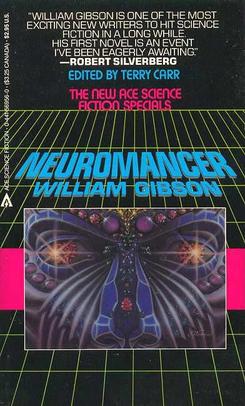This novel is one of the cornerstones of science fiction. It won the holy trifecta (Hugo, Nebula, and Philip K. Dick awards) and is considered the first major work, and possibly the most important, of the cyberpunk genre. For those who don't know, cyberpunk is a sub-genre of science fiction which some people think simply involves hackers and cyborgs and such, but from my understanding, the generally accepted application is, “high tech, low life.” Cyberpunk does usually feature the themes named earlier, but that is because of the popularity of this novel, Neuromancer.
For a novel so influential, how could I not pass this up? In fact, this was one of the first novels I bought in the science fiction genre, and I put off reading it for a while afterward. Once I started reading it, I thought it was neat. Not too far into the book, however, I got a little confused. I figured I might've just been missing details, but I looked back again and missed nothing. I figured that I might've had a bad print, but I checked other printings just like it and they were the same. At that point, I figured I'd just keep reading, because it might've been a one time occurrence. But no. Confusion kept happening. I kept looking back for details I might've missed. I kept wondering what was going on. I kept being confused and irritated by this novel. So I figured there were only three potential causes for this problem: the editors, the publishers, and, of course, the author himself, William Gibson.
Keep in mind, I don't mind being left in the dark on certain things, and I sometimes even love figuring things out for myself, like I'm slipping pieces of a puzzle together. I like puzzles. What I don't like, however, is lack of necessary detail; missing pieces of the puzzle. That seems to be William Gibson's biggest problem, with this novel at least (haven't read any other works of his yet), is clarity. I don't even mean about these computer terms he's using, because I can actually understand several of them (he still could've written an appendix in, though). The real problem is with pacing. Seems to me Gibson loves to jump from one place to another without warning or reasoning. All of a sudden, we'll just be set in a place and the characters are doing something and there's no real clue as to why, and the question constantly remains, “How and why?” Seems to me he went the overly artsy route while eschewing plot details, and from what I've read in tips written by publishers, they normally don't like that, so I wonder how this got published in the first place.
But that's not the only reason I couldn't feel emotionally attached. I honestly couldn't find myself caring a lick about hardly any of the characters, especially the protagonist, Case. Whenever we read his thoughts, he tends to go on a pseudo-intellectual analysis spree and does not indicate whatsoever that he has a single ounce of an emotion. It's hard to relate to a character and even the surroundings if I can't feel along with them.
But that's not the only reason I couldn't feel emotionally attached. I honestly couldn't find myself caring a lick about hardly any of the characters, especially the protagonist, Case. Whenever we read his thoughts, he tends to go on a pseudo-intellectual analysis spree and does not indicate whatsoever that he has a single ounce of an emotion. It's hard to relate to a character and even the surroundings if I can't feel along with them.
So I don't even see why Neuromancer is praised as much as it is. Because it's artsy and pretentious? How people can fully understand exactly what is going on, or even just enough to really like it, I've no clue. From what I understand of the overall plot (and I'm pretty sure I do at least understand that), it is interesting, but the adventure is something to be desired, and that's what holds the novel back. This was, without a shadow of a doubt, not the worst novel I've ever read (not even in the science fiction genre), but definitely the most frustrating. I almost stopped reading it, but I pressed on because I figured I was close enough to finishing it anyway, so I did. Not even a noteworthy ending, really; just what you expect to happen. Not always a bad thing, but considering the frustration in dealing with this mess of a novel, a unique or inspired or a more unexpected ending would've made the trip at least a little more worth it.
So I'm sorry to disappoint for those interested, but don't believe the hype. Neuromancer is heavily overrated. Not recommended at all, even if you happen to like cyberpunk.
Additional super fun fact: Neuromancer is absolutely not the first work that falls into the cyberpunk genre. Don't be misled by people who make that claim. The first would probably be The Stars My Destination by Alfred Bester. Might've even been something before that, but that's the earliest I know of (released in 1954). If anything, Neuromancer simply got the ball rolling faster, particularly on certain (now worn and tired) themes.
Another additional super fun fact: Apologies first and foremost for forgetting where I have read this, so I cannot provide a source, but apparently William Gibson himself has stated this was one of his weakest works.
Another additional super fun fact: Apologies first and foremost for forgetting where I have read this, so I cannot provide a source, but apparently William Gibson himself has stated this was one of his weakest works.

No comments:
Post a Comment